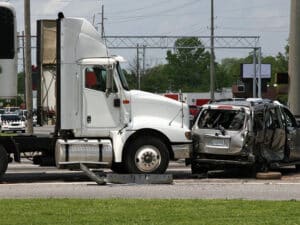What to Do After a Truck Accident
Last updated Tuesday, June 27th, 2023

This article is an extract from the ‘Ask The Hammer‘ podcast in which I discuss the steps involved in a crash with an 18-wheeler truck or large commercial vehicle. I also discuss who can be sued in a truck accident and provide helpful legal thoughts for truck drivers.
Steps to Take in a Crash Involving a Large Commercial Vehicle
Before diving into the steps, let’s first see what a commercial vehicle is.
It could be a car having a commercial insurance policy, as a driver might work on behalf of a business or company. So commercial coverage might be considered business-related.
We’ve had cases where companies get people to do temporary work in a regular car. But it’s a commercial policy because they’re working on behalf of a company.
Trucks are a little separate. When an accident happens with one of these big trucks, there are two ways to look at it:
- Police need to be called immediately, and
- If you’re in a car, hit by a truck, and injured, get medical help immediately.
Use your cell phones to record your thoughts or things in your surroundings. Take some pictures if you can move around to get stuff prepared that you can use later on.
What if the trucking or insurance company calls before I speak to a lawyer?
These trucking companies do not want to give a statement because they risk having anything they say used against them in the future.
I always say if you’re injured or if you’re hurt, get a lawyer.
Because if you are injured, you will go to the doctor. You certainly would not treat yourself.
These insurance companies have a massive staff of investigators. They have doctors, lawyers, and experts at their disposal. So you need to get someone immediately if you haven’t hired somebody.
And if they call you, do not say anything. Instead, call an attorney and have the attorney call them back.
Who can be sued in a truck accident case?
The wrongdoer is the person who caused the accident, so file against that driver. But if he’s working for a company, then go after the company and their insurance.
Let’s say one of my employees went out and hurt someone. They may sue him, but they will come after our coverage. So any judgment he gets, our company must take care of it unless it maxed the insurance limits.
Most people out there don’t have assets beyond insurance coverage. So you always have to go up to the person who’s at fault. And that’s why you hope if someone with a commercial policy hits you, they have a significant insurance policy, especially if you have monster damages.
How do individual truckers interact with one another?
When the trucker calls the accident, his insurance company and the employer will tell him not to talk to the other side. They “lawyer them up” so they don’t have to talk to anybody. You have to go through their lawyer. That’s why we recommend the injured person do the same.
Once a person is represented, you can’t talk to them unless you get the lawyer’s permission, and they never give it.
What is my course of action in the days following a truck accident?

All the tragedies cause people a lot of financial damage. Suddenly, they can’t work and get injuries and medical bills. So often, the best thing to do is get a lawyer.
Now the other scenario is anytime you’re hurt, you need to get medical care and follow the medical advice. It is the best thing people can do to help their cases.
If a doctor says you need therapy, show up for that therapy. When you do not go to the doctor, it shows you are not that hurt or care much about your case.
What factors cause such high costs in truck accident cases?
These trucks carry tons of weight. So they cause colossal damage.
Many truck cases result in death or serious injuries, like paraplegic or quadriplegic, or you might lose an arm or a leg. So you’re just talking about extensive damages.
That’s why the truck companies carry significant limits, which is why they try to fight it.
When a road property gets damaged in a truck accident, who pays for it?
With some of these significant accidents involving large commercial vehicles like trucks, considerable cleanup is required on the highways and the roads. That’s not something we handle because it is a separate matter.
There are a lot of rules and regulations to go with truck drivers.
Let’s say the driver violated something, and they have the proof. They might find the company’s owner and punish them, but the truck driver might also be responsible for a big cleanup or spill.
But if the person is injured in the accident, they will not join that lawsuit.
What categories of driver negligence seem to be repeated more commonly by truckers?
The list is endless. It could be anything from truckers not paying attention to texting while driving.
For example, once, we got a case in which a trucker was carrying an excess load that wasn’t allowed by law. And rather than going through the truck stop, he took side roads and caused a severe accident. If the driver knew he had an excessive load, he would be guilty of the accident.
So you can’t become a truck driver quickly. You need a lot of training to learn what not to do. It’s extensive.
What is the positive or helpful message to drivers of trucks and commercial vehicles?
These people that drive want a job. However, sometimes they are put in challenging scenarios. For example, they might get fewer breaks or less sleep or have to deliver a load under specific time constraints.
So sometimes, it’s unfair to the truck drivers, and attorneys recognize it.
Even though the trucker often causes the accident, it is frequently considered if his employer or the trucking industry somehow constrained him.
I always tell people, whether truck drivers or regular drivers, to follow common sense and basic rules:
- Avoid following a car too closely.
- If you’re carrying a heavy weight, give yourself extra time to brake.
- Don’t go over the speed limit.
- Inspect the tires often because of hard wear and tear; sometimes, truckers have to get a tire change.
Client Settlement
Are you seeing cases going all the way to a jury decision? Are they settling?
You have to work them all. It’d be great if they got settled along the way. Sometimes they do the right thing, and sometimes they don’t. Often it gets settled during the trial.
But you have to prepare your case like it’s going to be tried.
Does the settlement mean giving up the fight?
Anytime you can settle, it’s a great day. Because the client, most of the time, won’t settle unless they’re pleased with the settlement.
But sometimes, the settlement might be the policy limits.
Let’s say a trucking company has a $1 million policy limit. That’s all they have. And if you can get that in a settlement without going to court, that’d be great. It will not always be that way. But the settlement doesn’t show weakness.
Likewise, even if you’re headed for a trial, the judges will want you to do mediation–they’ll get a neutral party before they go to trial. Get both sides to sit down, and then the mediator will try to talk to both sides and see the issues. Sometimes remediation gets it settled.
So settlement is not necessarily a bad thing.
Do people have to wait for the completion of cases? Is that a typical way how things work In law?
Yes. In one of our significant cases, the court struggled to resolve a problem between the parties and the insurance companies.
And one of them appealed at the Court of Appeals. So now it’s in the court of appeals, and the trial judge said, “I have to put this on hold until the court appeal decides.” So they will be delayed a year.
Sometimes it’s part of it. These clients must understand that if they’ve been wronged, damaged, or hurt, they must stay in for the fight to get what’s fair and owed to them.
Thoughts on Truck Cases
The biggest thing is truck cases are complicated, and there are a lot of great truck lawyers out there. So don’t appoint a lawyer who hasn’t done any truck cases.
Over the years, we’ve done hundreds of truck cases.
Suppose you are sent on an errand by your employer in your vehicle. Would that be considered for commercial purposes?
It depends on if the company you work for has an agreement in writing that you’ve signed, saying “you take all the risk.” Or “when you drive your vehicle, you must have your insurance.” That may boil down to what’s been agreed in the labor contract.
We have a few vehicles at work in our law firm, and we may have to have a person run down to the court to file a paper or go to the post office. So every time they get in our car, it’s considered commercial. And our policies would cover it, not theirs.










